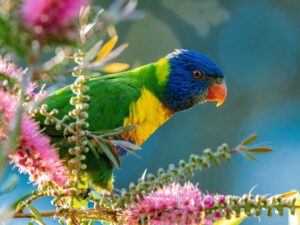In honor of Earth Day, let’s take a look at the many ways birds, including parrots, play vital roles in maintaining healthy ecosystems. Our avian counterparts contribute to the environment in several important ways:
Seed Dispersal

Many birds, including parrots, play a significant role in dispersing seeds, especially in tropical and subtropical regions, which support tropical forests and other habitats. By consuming fruits and nuts and traveling across large areas, parrots inadvertently deposit seeds in new locations through their droppings, which often contain intact seeds. This behavior aids in the growth and spread of many plant species, enhancing forest density and diversity, which are vital for ecosystem health and stability. Seed dispersal superstars include parrots like African greys, macaws, Amazon parrots, and cockatoos.
And bees aren’t the only pollinators! Birds that feed on flowers’ nectar, most notably hummingbirds, help pollinate their environment. When lories and lorikeets use their brush tongues to feed on flowers, pollen collects on their foreheads and throats. When they move to another flower of the same species, they inadvertently transfer the pollen to another flower. Pollen transfer enables seed production and supports the plant’s reproduction cycle.
Pest Control
Birds consume a large number of insects and in doing so act as nature’s pest control. This natural form of pest management helps reduce the spread of disease and can help agriculture by reducing heavy reliance on chemical pesticides. Some notable bird species that are particularly effective at controlling pests include:
- Swallows & Martins: These birds feed almost exclusively on flying insects, including mosquitoes, flies, and moths.
- Chickadees & Titmice: In temperate regions, these small birds consume vast amounts of caterpillars and other insects during the breeding season, helping to protect forests and gardens from pest infestations.
- Bluebirds: Their diet includes grasshoppers, beetles, and larvae, making them beneficial for natural pest control in gardens and agricultural fields.
- Owls: Barn owls and other owl species help control rodent populations.
- Purple Martins: These birds consume large quantities of flying insects, including those considered pests.
- Sparrows & Finches: We see them every day but did you know that these birds feed on a variety of ground-based insects and seeds and in doing so help to control the spread of weed seeds and harmful bugs?
Ecosystem Indicators
Birds are often considered indicators of the ecological health of an environment. Changes in their populations can indicate changes in the ecosystem, such as pollution levels, climate change, and habitat loss. Monitoring bird populations helps conservationists detect and address environmental issues early. Here are a few bird species that are considered ecosystem indicators around the world:
- Puffins: Puffins are often used as indicators in marine ecosystems, particularly in the North Atlantic. Changes in their diet and breeding success can reflect shifts in fish populations and ocean health.
- Arctic Terns: With the longest known annual migration, Arctic Terns are indicators of changes in marine ecosystems across the globe. Their breeding success is linked to the availability of fish driven by sea temperature changes.
- Common Loons: Used as indicators in freshwater ecosystems, particularly in North America. Their presence and reproductive success are sensitive to changes in water quality and fish populations.
- Forest Owls (like the Spotted Owl and the Barred Owl) – These owls indicate the health of forest ecosystems. Their population dynamics can reflect changes in forest structure and prey availability, often impacted by logging and land use changes.
Through their diverse behaviors and ecological roles, birds are integral to environmental health and the sustainability of various ecosystems around the world!





